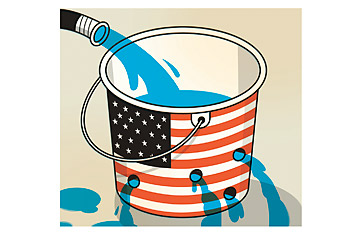
Investors parse federal reserve meeting notes the way believers in Kabbalah parse ancient texts. If Ben Bernanke says might rather than may regarding a particular policy action, markets react. The import of his words, perceived and real, has grown in tandem with political dysfunction in Washington, since Bernanke--along with his Continental counterpart Mario Draghi, head of the European Central Bank--are the last men standing between the West and economic stagnation. Politicians can't or won't act to stimulate the economy. Only central bankers can save us.
But can they really? Does the Fed actually have any more useful tools in its kit to spur U.S. economic growth, which was a truly lethargic 1.5% in this past quarter? The answer is yes, but the tools aren't the ones that were talked about at the most recent Fed meeting. Bernanke indicated then that the bank was willing to continue pushing interest rates down into 2014 but fell short of announcing another round of quantitative easing, in which the Fed buys large sums of Treasury bills from banks in an effort to increase the money supply, boost bank lending and jolt the economy into action.
Bernanke's stutter step is good, because the past couple of rounds of Fed bond buying have been much less effective than the first. Once markets adjusted to the shock and awe of the first round, they started pricing in the effects. In all cases, much of the benefit went to the wealthy, anyway; stocks got a jolt, especially the first time around. But the mortgage market was less affected, and that's what matters for a middle class whose wealth is still tied up in housing.
This speaks to the conundrum facing the Fed. In the absence of real fiscal stimulus by government, central bankers are left to try to stimulate the economy on their own. But their traditional tools for doing so--low rates and bond buying--are either no longer effective or not applicable to today's problems. (In the U.S., quantitative easing was developed to deal with economic problems at home, not the headwinds currently emanating from Europe.) In order to keep things afloat until politicians get their act together, the Fed needs new strategies. They exist but come with risks. Bernanke and Co. could, for example, decide to stop paying the small amount of interest it pays to banks that park cash with the Fed, thereby pushing those funds into interest-yielding money-market accounts. But there are already well-founded worries that money-market funds are susceptible to bank runs--and unlike commercial accounts, they aren't federally insured. That's a $2.6 trillion disaster waiting to happen.
A more useful approach would be to target the mortgage market directly, since boosting the housing market would boost the economy at large. New-home construction is a jobs generator, and we sure could use them.
